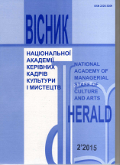PARISIAN "HÔTEL PARTICULIER" AS THE CONCERT CENTRES OF XVIII ITEM
DOI:
https://doi.org/10.32461/2226-3209.2.2015.138390Keywords:
hôtel particulier, style of rococo, aristocratic salon, patrons of art, concerts, actors-virtuososAbstract
In article secular concert life in small city private residences – Parisian "hôtel particulier" reveals. Features of architecture, and also an interior with oval forms of salons and a decorative list in style of rococo are underlined. It is presented the historical data about private life of owners of the well-known Parisian salons XVIII item. The High-ranking persons and the aristocrats, rich bourgeoises and patrons of art collected at themselves outstanding French and foreign figures, poets, musicians and actors. The influential, formed and charming women of this time acted as organizers of playing music, were the main ornament of salons, and also promoted development of secular concert life. In these salons there were concerts in which known muzikanty-executors acted as composers, conductors and heads of evenings, they became the centres of development masterly concert execution, new instrumental and orchestral products, such as a symphony.
Downloads
Published
Issue
Section
License
Authors who publish with this journal agree to the following terms:
1. Authors retain copyright and grant the journal right of first publication with the work simultaneously licensed under a Creative Commons Attribution License International CC-BY that allows others to share the work with an acknowledgement of the work's authorship and initial publication in this journal.
2. Authors are able to enter into separate, additional contractual arrangements for the non-exclusive distribution of the journal's published version of the work (e.g., post it to an institutional repository or publish it in a book), with an acknowledgement of its initial publication in this journal.
3. Authors are permitted and encouraged to post their work online (e.g., in institutional repositories or on their website) prior to and during the submission process, as it can lead to productive exchanges, as well as earlier and greater citation of published work (See The Effect of Open Access).


